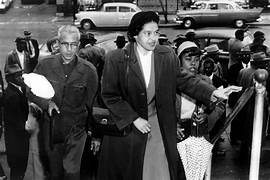On December 1, 1955, an ordinary woman named Rosa Parks took a stand against racial segregation in the United States by refusing to give up her seat on a bus in Montgomery, Alabama. This simple act of defiance would go on to become a pivotal moment in the Civil Rights Movement and a symbol of resistance against injustice.
Rosa Parks, an African American woman, was on her way home from work when she boarded a city bus. At that time, racial segregation was deeply entrenched in American society, and buses were no exception. The seats on the bus were divided, with white individuals having priority and African Americans forced to sit at the back or give up their seats to white passengers if the front was full.
As the bus filled up, the driver demanded that Rosa Parks and three other African American passengers give up their seats for white passengers. While the others reluctantly complied, Rosa Parks refused to move. Her act of defiance was not premeditated, but rather a spontaneous response to the injustices she and other African Americans faced daily.
Rosa Parks' refusal to give up her seat led to her arrest and sparked a wave of protests and boycotts throughout Montgomery. The Montgomery Bus Boycott, which lasted for over a year, was a significant turning point in the Civil Rights Movement. African American citizens, led by influential figures such as Martin Luther King Jr., organized a mass boycott of the city's bus system, refusing to ride until segregation was abolished.
The boycott had a profound impact on the city's economy, as African Americans constituted a significant portion of the bus ridership. The determination and resilience of the boycotters, who walked long distances or carpooled to their destinations, garnered national attention and support for their cause. The Montgomery Bus Boycott demonstrated the power of nonviolent protest and civil disobedience as effective tools for social change.
Rosa Parks' courageous act also brought attention to the broader issue of racial segregation in the United States. It shed light on the everyday indignities faced by African Americans and sparked a national conversation about civil rights and equality. The Montgomery Bus Boycott inspired similar actions and movements in other cities, leading to increased pressure on lawmakers to address racial discrimination.
Ultimately, the efforts of Rosa Parks and the Montgomery Bus Boycott were successful. In December 1956, the Supreme Court ruled that racial segregation on public buses was unconstitutional, marking a significant victory for the Civil Rights Movement. The boycott not only dismantled segregation on buses but also served as a catalyst for subsequent civil rights campaigns and legislation, such as the Civil Rights Act of 1964.
Rosa Parks' act of defiance and the subsequent Montgomery Bus Boycott remain iconic symbols of resistance against racial discrimination and injustice. Parks' quiet strength and unwavering commitment to equality continue to inspire generations of activists fighting for social change. Her legacy serves as a reminder that ordinary individuals can ignite extraordinary change and that even the simplest acts of resistance can have a profound impact on society.






